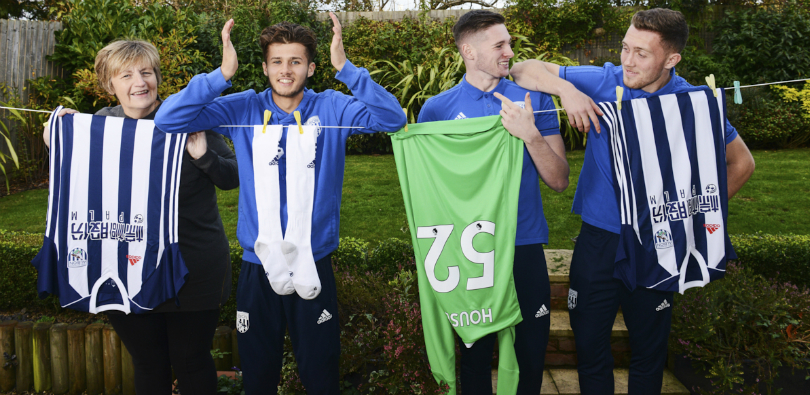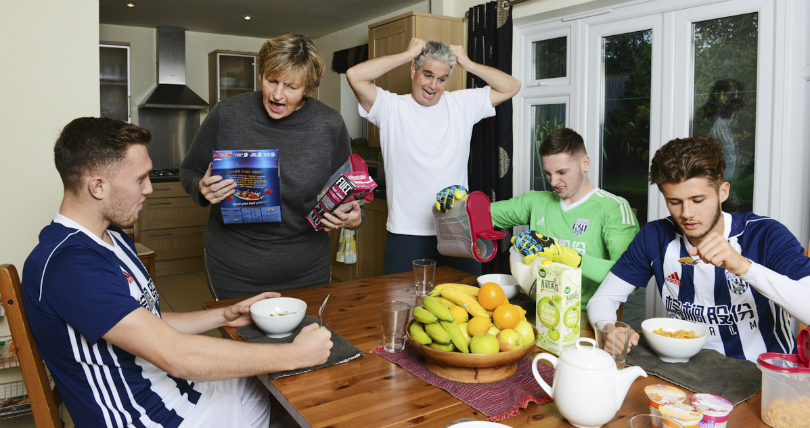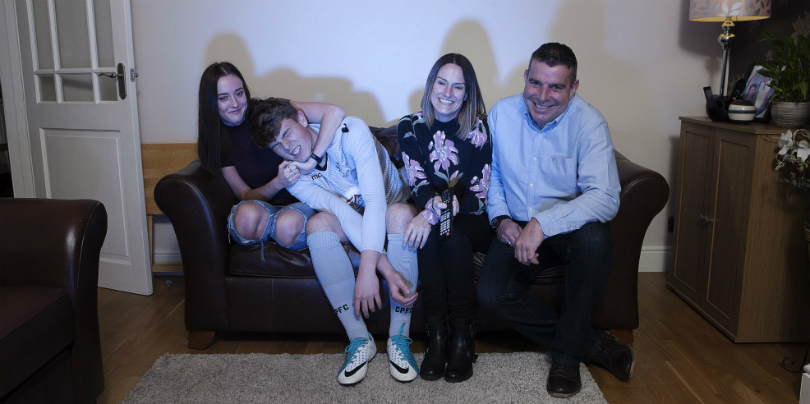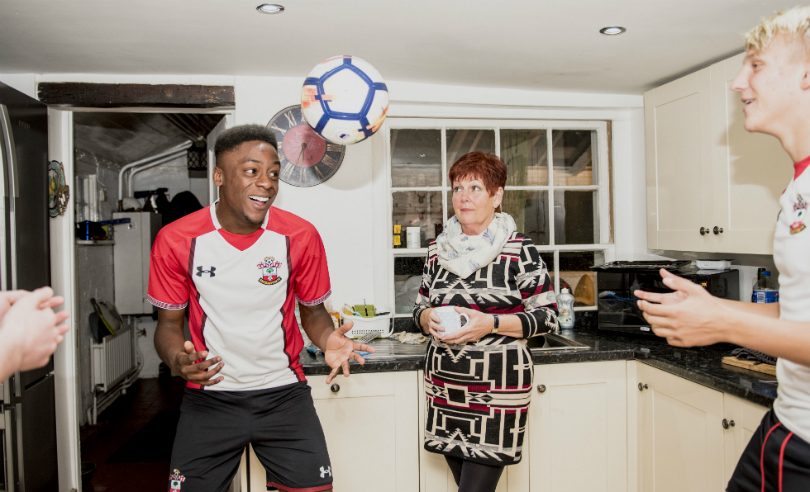Inside the weird world of host families
Hundreds of households nationwide take in academy players - but what motivates them to open their doors to the game's budding stars? FFT pops round to find out...


Team: West Brom
Family: Julie and Grant Wood
Players: Dara O’Shea, Jamie Soule, Bradley House
Three teenagers are living in a house fit for a Premier League star, but this is not their property and the framed jerseys hanging from the walls are not theirs, either. This is the Midlands abode of Julie and Grant Wood – parents of Burnley frontman, Chris. They had so much fun rearing one player that the chose to do it all over again. “We believe in karma,” says Julie. “Football has been good to us, so we wanted to give something back by looking after players.”
Their goalscoring son lived with a host family for two weeks when he was on trial with West Brom as a youngster, but he wasn’t given a warm welcome. “He didn’t feel comfortable because he was living in an environment which was so different to back home.” After the Baggies offered him a professional deal, the Woods left their native New Zealand for England and Chris moved back in with his mum and dad. “Chris thought we were mad,” admits Julie. “He said, ‘You’ve just got rid of me, why do you want more kids?” “But he understands why we’re doing it – he knows the problems other players had. “They had vowed if Chris’ career took off, they would ensure that other academy players didn’t have the same unsettling experience as their son. “Some of them are still children,” adds Julie. “They need to live in a caring environment.”
West Brom academy prospects; Dara O’Shea (18), Jamie Soule (16) and Bradley House (19), now live under their roof, but the Woods are no soft touch. “We run strict digs,” insists Grant. “Julie makes their food, but the boys have to clear the table and wash the dishes after every meal.” They also enforce curfews set out by the club. “They have to be in by 10pm on weekdays and 11pm on Saturday nights,“ adds Julie. “Jamie is allowed to visit his girlfriend two evenings per week. He wanted to see her on Friday nights but we said no. We know what it takes to become a footballer – rest is just as important as training.”
It’s a structured existence, but the boys enjoy the freedom of their luxury suburban home. They all have sizeable bedrooms, access to Sky TV and a games console in their own social space. But are none of them jealous of the carefree lives of their friends back home? “We have to sacrifice our social lives, but this is what we all want,” says House. They are also confident Julie and Grant’s wisdom will help them to advance their careers. “We look at the success Chris has had and they’ve played a big part in that,” says Republic of Ireland under-19 defender O’Shea. “Julie and Grant are like second parents to us and we’re very lucky to be living in such a nice house.”
The former’s made a start on turning her boys into men by dishing out cooking lessons to get their culinary skills up to scratch. She recently gave them all a recipe to follow, which they then cooked up for the rest of the house. “It’s all about getting them used to being independent and self-sufficient,” she says. “I cook them meals, but they’re not going to have their mum making them their favourite meals once they have their own place. They also need to know the right foods to put in their body, which will fuel them properly on the pitch.“
Julie’s maternal instinct still burns strong –even baking a cake for FFT - but she’s aware that her and Grant’s role isn’t to replace the boy’s parents. “You do grow to love them, but it’s not unconditional love,” she says. “A few parents think we’re there to take over their role. I had one mother phone me up a few years ago, expecting me to check on him every two hours during the night because he was unwell. I said ‘if he’s that ill I suggest you pick him up.’ Another one wanted me to give him lifts everywhere, but they have to learn to do things for themselves.”
Get FourFourTwo Newsletter
The best features, fun and footballing quizzes, straight to your inbox every week.

Team: Crystal Palace
Family: Michelle Seagar, Hayley Seagar, Nigel Pugh
Player: Oliver Webber
Michelle Seagar and Nigel (xxx) never intended to become football foster parents - it just sort of happened. “We knew someone at Crystal Palace and she asked us if we’d mind letting a triallist stay for the night,” says Michelle. “We agreed to do it as a favour and we’ve been looking after players ever since.” The couple have two children of their own – son Jamie (17) and daughter Hayley (20) - but in the five years that have passed, a host of academy prospects have joined them at their four-bedroom home in West Wickham - a 15-minute drive from the club’s Beckenham training ground.
Their current lodger is goalkeeper Oliver Webb (17). He arrived in Northern Ireland to sign for Palace and has quickly become part of the family. “It’s like having another little brother around the house,” says Hayley. Webb is also enjoying his new life in his new home, after a difficult start. “I was very upset and scared at first because I didn’t want to leave home, but I’m really happy here now,” he says. “I’m very close to Michelle and Nigel, I can talk to them about anything.” Michelle admits she relishes the chance to impart female wisdom to the boys who walk through her door. “We used to have a boy called Colm living here and I’d give him plenty of girlfriend advice!”
The couple were well prepared for the challenges of hosting footballers following a brief and turbulent period as foster parents. “We looked after some very difficult children,” she says. “Some were verbally and almost physically aggressive – it was horrible for our own children to watch that and in hindsight they were too young to cope with it.“ After that experience, dealing with adolescent players has been a walk in the park. “We’ve never had a problem with any of them, they’ve all been good boys,” she says. “They have their own routines and don’t finish training until 4:30pm, so they don’t have the energy to start playing up.” Webb’s routine is also a perfect fit for the couple’s flexible day jobs. Michelle is a children’s nanny, while Nigel works as a postman.
However, being a host family is not without its challenges. Several years ago they were asked to look after player at short notice, but the club failed to inform them he was lactose intolerant. “He arrived at 8pm at night and we realised he could only eat gluten free food but had nothing in,” says Michelle. “I told the club they needed to start giving us nutrition guidelines, which they’ve done.” Palace’s host families also had to appeal to the club to raise the fee they’re paid for housing players. “It was £15 a night for two players, but it just wasn’t enough. A number of us complained, so they raised it to £20. Other inner London clubs are paid more, but it’s enough now to cover everything.”
Michelle and Nigel are now one of the club’s most experienced hosts and have dabbled with the idea of taking on other aspiring pros. “At one point we toyed with the idea of buying a bigger house to cater for more players, but I think we’ll probably stop after a few more years,” says Michelle. “We love doing it and I can’t imagine me and Nigel rattling round a big empty house, but once our kids have left home, I expect we’ll down size and then move abroad.” Until then, they’re hopeful one of their lodgers goes on to play for Palace’s first team. “We looked after Keshi Anderson who is on loan at Swindon, but we haven’t had a boy who has gone on to play for Palace yet. I go to most home games with my son so it’d be amazing to see one of them make it.”

Team: Southampton
Family: Karen & David Merrick
Players: Simon Kozak and Jonathan Afolabi
When the last of Karen and David Merrick’s children had flown the nest, they realised the Southampton coupled realised the quiet life just wasn’t for them. “We had this big empty house and suddenly felt very alone,” Karen says to FFT. They decided there was no better way to restore some madness to their lives than by opening their doors to teenage footballers. Four years ago they applied to become a host family for academy players at Southampton, who had flown the nest to pursue a career on the south coast. They now look after two youngsters, just around the corner from the club’s training ground. “We knew friends who were doing the same thing and Dave is a Southampton fan, so we decided to take the plunge,” Karen adds.
The Merricks are just one of 52 families on the Saints’ books – making them the biggest housing operation in the Premier League. All hosts are required to live within a 20-minute radius of their Staplewood Campus base, so they’re within easy reach of a fleet of club minibuses, which ferry the players to and from training. Every family also has to undergo a series of interviews before a panel of Saints staff vote on their suitability. Safeguarding officer Emma Walker – who is on-call 24 hours a day, five days a week, to deal with potential issues - is in charge of running the operation. “All of the hosts are different; some are couples, some have children, others are alone,” she tells FFT. “We want a relaxed environment where the players can be supported away from the pitch.”
Players aged from 13 to 16, who travel a certain distance from home are offered the chance to stay with a family up to three nights per week. If they remain with the club beyond 16, the search then begins for the ideal hosts to live with on a full-time basis. “We go into minutiae detail,” says the club’s academy manager, Matt Hale. “We ask them if they would mind living with other children in the house or with pets. If a player has an allergy to a certain pet, we would ask them if they’d prefer their own room. Ultimately it’s up to the player – he will have a look around and his parents will also come and meet various families before a final decision is made.”
For Slovakian defender Simon Kozak (16) and Irish frontman Jonathan Afolabi (17), Karen and David’s plush five-bedroom property fitted the bill. “As soon as I had a look around here I knew this is the right place,” says Afolabi. ”Karen and Dave were really welcoming and I liked the idea of living with a team-mate.” Both boys have their own bedrooms and share a living area, which serves as a battleground for Fifa tournaments during their down time. Karen is keen for them to let their hair down away from the daily grind of training, but admits she’s mellowed since her kids left home. “If they want to play their music at full blast, I don’t mind,” she adds. “My kids say I’ve gone soft, but I’m not their parents, it’s not my place to rant and rave.”
It sounds like a relatively leisurely life, but it’s no holiday camp. Both boys are living away from home for the first time and won’t return to their native countries until the end of the season. “My first year in digs was pretty difficult – I found it a big change,” says Afolabi. “But Karen is so warm that it’s been easy living here this year.” Kozak, meanwhile, has had to learn a new language as well as a new way of life and even pronounces several words with an Irish twang; such is the amount of time he spends with his housemate. “Living with someone I play with has helped my English a lot – I spoke very little when I arrived - and it helps on the pitch as well because we know each others’ personalities so well.”
The Merricks live in an adjoining cottage to give the boys space, though Karen cleans the house from top to bottom - on the provision they keep their rooms spick and span. “Simon’s room was a mess the other day, so I wrote a note in Slovakian on his door which said: ‘Your room is a tip!’” She also insists they all eat dinner together every evening so she can get to know them and create a family atmosphere. “I don’t rule with an iron fist, but I like us to come together as a family of sorts and talk about our days,” she says. “I’ve got a reputation for being a bit of a feeder, so they never go hungry!” All the hosts are paid a monthly fee to cover the food costs of hosting players, but it doesn’t provide a second income. “It’s more of a contribution and a thank you from the club, says Walker. “Most families are Southampton fans and just want to help – we want people who are doing it for the right reasons.”
Most of the families have vast experience when it comes to running a home, but the Saints are always keen to add new strings to their hosting bows. “We regularly run evening sessions at the club on nutrition with our families,” says Walker. “We want to make sure the players are eating the right food so they can train and play to the best of their ability. We offer handbooks as well to give the families guidance on what we hope they’ll support the players with. It’s not just the families who are provided with schooling. Academy players are put through a life skills programme to aid their transition to adulthood. “It covers everyday things such as cooking, running a car and booking driving lessons,” she continues. “We also have discussions with hosts about what we expect from the players in terms of behaviour. It’s important they socialize with the family and learn important social skills. They’re representing the club, so we want them to be well mannered.”
Walker visits each household every six weeks to identify any teething problems, but there is little to worry about in this house. In fact, the only sign of teenage excess is Afolabi’s growing collection of trainers in his bedroom – which currently stands at 12 pairs. However, the club are still keen to keep an eye on their emotional progress. “We talk about their maturity a lot because we want them to become responsible adults, not just footballers,” says Walker. “If they get a professional contract when they’re 18, we need to know if they’re ready to live on their own or if they need more time with a family. “ When the time does come to cut the apron strings, Karen admits she finds it hard to let go. “It’s tough, because they become part of your routine, but you know when they arrive, they’re going to leave one day. You have to say to yourself ‘they’re not yours to keep.’”
